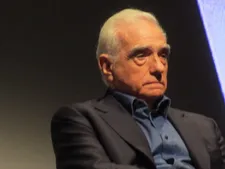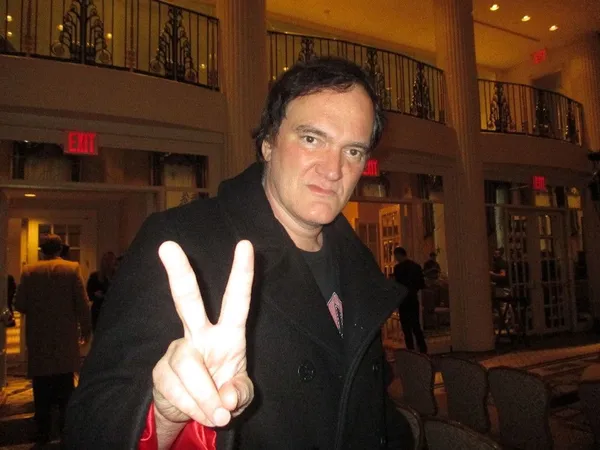 |
| Jonathan Taplin on Quentin Tarantino’s Once Upon A Time … In Hollywood: “It’s easy to make a kind of cartoon out of the late Sixties and early Seventies.” Photo: Anne-Katrin Titze |
In the third installment of my conversation with film producer (and so much more) Jonathan Taplin on his terrific memoir, The Magic Years: Scenes From A Rock-And-Roll Life (Heyday), we discussed his first meeting with Martin Scorsese and their working relationship, the sadness in Harvey Keitel’s Charlie in Mean Streets, Robert De Niro’s Jake LaMotta in Raging Bull, Ray Liotta’s Henry Hill in Goodfellas, and the end of The Irishman. Jonathan calls the Sixties, “a decade of real true liberation that got sidetracked by the assassination” of John F Kennedy, Martin Luther King Jr., and then Bobby Kennedy. We start out with a critique of Quentin Tarantino’s Once Upon A Time … In Hollywood, Sharon Tate and Charles Manson, and end up with John Wayne, Raoul Walsh or whoever got in the way of Marty becoming a priest.
From Los Angeles, Jonathan joined me on Zoom to talk about his illustrious life in-depth.
Anne-Katrin Titze: You mention Tarantino’s Once Upon a Time … in Hollywood.
Jonathan Taplin: Right.
AKT: As one of the examples where Manson is overshadowing a whole movement, all of the Sixties. You describe it as a trend that this one maniac becomes a stand-in for an entire decade. I spoke with Gay Talese about Once Upon A Time … In Hollywood; he had visited the Spahn Ranch then. It is a shame, you pinpoint that very well.
JT: I mean, it’s easy to make a kind of cartoon out of the late Sixties and early Seventies. Obviously, we’re constantly dealing with mental illness in America. We all know that perhaps a lot of ingestion of drugs can make it worse. He was an individual, obviously an insane individual, but sometimes insane people are very charismatic. We talk about manic-depressive. The manic side can often be very powerful to be around. I’ve been around manic-depressives; some of them were musicians. That Tarantino would make a kind of cliché of what was really happening or that was the meaning of the whole Hippie movement, that’s a big mistake, I think.
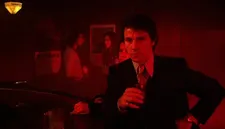 |
| Jonathan Taplin on Harvey Keitel’s Charlie in Mean Streets: “A part of that is Marty’s own struggle, which is obviously portrayed so well …” |
Quite honestly, it’s something that conservatives use to say that everything went wrong in the Sixties and that we’re still living with that problem. The point of my book is to kind of counter that; that actually the Sixties were a decade of real true liberation that got sidetracked by the assassination of three of the great leaders of that period, John F Kennedy, Martin Luther King, and then Bobby Kennedy. Those acts of murder kind of turned a lot of people away from the larger possibilities inherent in Bobby Kennedy’s campaign and Martin Luther King’s speeches. And that’s the tragedy. The tragedy is not some whack job who killed Sharon Tate.
AKT: I love that you end your book with that very powerful Bobby Kennedy’s speech about “the poverty of satisfaction”, about purpose and dignity. Those are two words, especially put together, that are very important right this moment. Purpose and dignity should be much more discussed than they are.
JT: And they’re still just as missing as when Bobby Kennedy spoke about it in 1967. We haven’t figured that out yet. We haven’t figured that out at all. My theory is, that part of the responsibility of the artist is to help figure that out. As Marcuse says, the artist’s job is to put what can be. That’s hard for people to understand, especially when in general a lot of the art is very dystopian or it’s so in the realm of fantasy. You know Marty got a lot of flack for criticising the Marvel Comic universe?
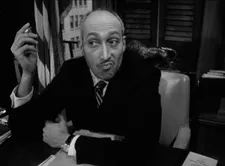 |
| Ira Rubin in Martin Scorsese’s It's Not Just You, Murray!: “I went down to see all his student films and I fell in love with a little short he made …” |
AKT: Right.
JT: But it is so in the realm of fantasy that it has no relationship to your real life.
AKT: It’s very interesting, I mean, you’ve worked a lot with fairy tales, for instance Shelley Duvall’s Faerie Tale Theatre.
JT: Right.
AKT: You bring up his “leather Gestapo coat.” It’s a very funny description. Why did he wear that coat in the summer? Did you ever find out?
JT: I couldn’t really understand it. It was like a uniform. And it was like 80 degrees outside and he wouldn’t take this coat off. It was so strange. And it was literally down to his ankles. That was the persona he wanted to portray, of this tough film director. My first meeting with Marty and subsequently I went down to see all his student films and I fell in love with a little short he made, It's Not Just You, Murray!, which you can see on YouTube.
I was really naïve, I didn’t know a) that you’re not supposed to put your own money into movies. In Hollywood they have a saying, OPM, other people’s money. But nobody told me about OPM. I just thought, I put some money in. I had a friend who said “I’ll equal that.” We each put in 250,000 and we made the movie [Mean Streets] for half a million dollars in 27 days. Marty had wanted to make the movie for so long that he had literally drawn out every single shot, every single angle, every cut, every camera move in these storyboard books. So when it came to make the movie, he would just bring out the book and show it to the cinematographer [Kent Wakeford] and bang. They were doing like 30 setups a day, which was unheard of.
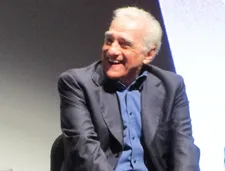 |
| Jonathan Taplin on Martin Scorsese: “He’s gotten to be a much more spiritual person.” Photo: Anne-Katrin Titze |
AKT: Something that felt very perceptive and that I never thought about - you say his best characters are self-destructive. That holds true. And you say he was exhibit A himself. Then you link it to Toni Morrison and then this question arose about characters going to hell. I never in my life thought about which movie characters would deserve to go to hell. Who do you think should go to hell?
JT: Well, the funny thing about Marty is he refuses to make a judgement. Even Raging Bull, he ends it with a saying that it’s not for me to judge, a saying from the Bible. Marty gives leeway to a Henry Hill in Goodfellas or to Bobby [De Niro] in every one of his portrayals. It’s certainly with a kind of sadness that you feel about these characters. I mean, the end of The Irishman in the old folks home - there’s really a deep sadness about these people who didn’t have enough perception to find their way out of this.
A part of that is Marty’s own struggle, which is obviously portrayed so well in Mean Streets in the sense that Marty is Harvey Keitel. Marty was going to be a priest until he was like 17. He was preparing to go to seminary and the movies got in the way. You know, John Wayne got in the way, or whoever, Raoul Walsh got in the way of his becoming a priest. His sense of balancing between my desire and my guilt, I think that’s a dynamic. And in terms of Marty’s own personal demons, I think he’s overcome those. With the help of Helen [Marty’s wife] and for the last ten years, he certainly doesn’t have a drug problem or anything. He’s gotten to be a much more spiritual person.
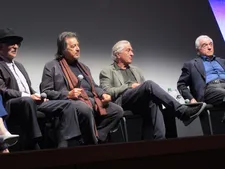 |
| Joe Pesci, Al Pacino, Robert De Niro and Martin Scorsese at The Irishman press conference Photo: Anne-Katrin Titze |
Read what Jonathan Taplin had to say on Julie Christie in John Schlesinger’s Billy Liar; Billy Wilder’s Double Indemnity; Edward Hopper, Katharine Hepburn and his mother; Wallace Stevens, and countering the pessimism of Ben Lerner.
Read what Jonathan Taplin had to say on working with Wim Wenders.
Coming up - Jonathan Taplin on Robert Frank and The Rolling Stones; Leni Riefenstahl, Jodie Foster, and John Hinckley, and Scott Hicks, Shine, and Harvey Weinstein.








